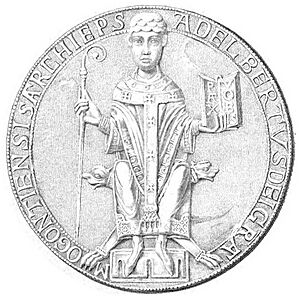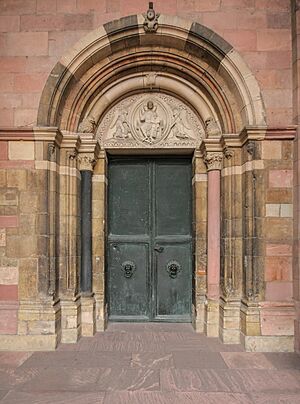Adalbert of Mainz facts for kids
Quick facts for kids Adalbert I |
|
|---|---|
| Archbishop of Mainz | |

Sketch of the seal of Adalbert on a falsified document from 1174-1211
|
|
| Church | Catholic Church |
| Diocese | Electorate of Mainz |
| In Office | 1111–1137 |
| Predecessor | Ruthard |
| Successor | Adalbert II |
| Personal details | |
| Died | June 23, 1137 |
Adalbert I von Saarbrücken (died June 23, 1137) was a very important church leader. He was the Archbishop-Elector of Mainz from 1111 until he died. This meant he was a powerful religious figure and also had a say in choosing the Holy Roman Emperor.
Adalbert played a big part in a major conflict called the Investiture Controversy. This was a long argument about who had the right to choose important church officials: the Emperor or the Pope. Adalbert strongly opposed Henry V, Holy Roman Emperor, the Emperor at the time. He also helped make sure Lothair III was chosen as Emperor in 1125, instead of Henry V's preferred relative. This decision changed how future emperors were chosen.
Contents
Adalbert I: A Powerful Church Leader
Early Life and Rise to Power
Adalbert was the younger brother of Frederick, Count of Saarbrücken. He worked as an imperial chancellor for Emperors Henry IV and Henry V. An imperial chancellor was like a top advisor to the Emperor.
In 1110, Adalbert was sent to Rome as part of an important group called an embassy. Their job was to arrange for Henry V to be crowned as Emperor. Adalbert supported the Emperor in his goal to get back the right to choose church leaders. In return for his support, Adalbert was given the important job of Archbishop-Elector of Mainz in 1111.
Standing Up to the Emperor
After becoming archbishop, Adalbert turned against Emperor Henry V. This was partly due to personal disagreements and partly because Adalbert wanted more land and power for his church. Henry V was very angry. He put Adalbert in prison for three years, from 1112 to 1115, without a trial. This happened because Adalbert refused to give the Emperor control of some important castles.
Adalbert was finally released from prison because the people of Mainz revolted and demanded his freedom. After his release, he actively worked against the Emperor. He used the fact that the Emperor had been excommunicated (kicked out of the church) as a reason to oppose him. Many German church leaders were already turning against the Emperor because the Pope was campaigning strongly. Adalbert quickly became the leader of these bishops who were against the Emperor.
The Fight Continues
When Henry V went to Italy in 1116, Adalbert encouraged many parts of the country to rise up against the Emperor. The conflict continued to grow. When Pope Calixtus II became Pope in 1119, he made Adalbert a papal legate. This meant Adalbert was a special representative of the Pope.
After this, Henry V attacked Mainz. In response, Adalbert convinced the Saxon nobility (powerful families) to revolt. Both sides met for battle, but they decided to negotiate instead. This led to a temporary peace. The big argument between Adalbert and Henry V finally ended with the Concordat of Worms in 1122. In this agreement, the Emperor gave up his right to choose church leaders.
Choosing the Next Emperor
Even after the agreement, Adalbert still had strong feelings against Henry V. When Henry V died in 1125, Adalbert saw a great chance to make a big change. He believed that the German monarchy (the system of kings) was too powerful. He wanted to weaken it by stopping the idea of hereditary succession. Hereditary succession means that a king's son or a close family member automatically becomes the next king.
In the past, when a new king was chosen, it was usually just a formality. The son of the living Emperor would almost always become the next king. In this case, Henry V's nephew, Frederick II, Duke of Swabia, seemed like the obvious choice. However, Adalbert got hold of the imperial insignia (the symbols of the Emperor's power). He then worked to stop Frederick from becoming king.
Adalbert convinced the nobility that having a king's family automatically take over was not good for them. He persuaded them to choose Duke Lothair of Saxony instead. Lothair was seen as a weaker candidate. Lothair became Lothair III. This election was very important because it showed that the nobility could no longer be counted on to vote for a king's chosen heir. This forced future kings to make even more promises and give more power to the nobility if they wanted their sons to be elected.
Adalbert's Legacy
Adalbert died in 1137 and was buried in a chapel at Mainz Cathedral. His nephew, Adalbert II, became the next Archbishop of Mainz. Adalbert I's actions had a lasting impact on the power balance between the Emperor and the powerful nobles in the Holy Roman Empire.
 | Stephanie Wilson |
 | Charles Bolden |
 | Ronald McNair |
 | Frederick D. Gregory |


